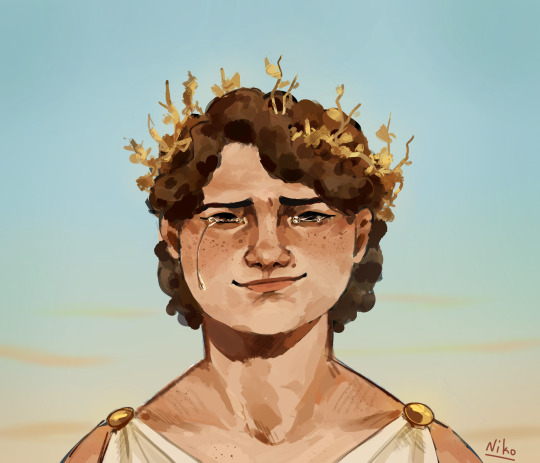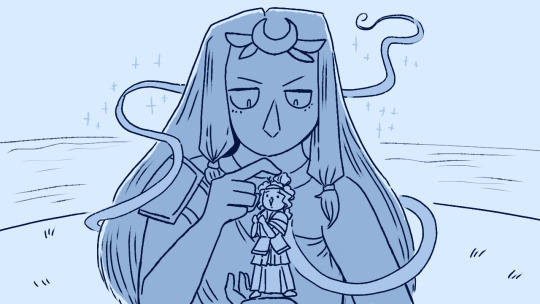#iphigenia at aulis
Text

Iphigenia
225 notes
·
View notes
Photo


Iphigenia (1977)
#iphigenia#agamemnon#house of atreus#iphigenia at aulis#euripides#hellenism#iphigenia 1977#okay still sobbing#mine
198 notes
·
View notes
Text


#greek mythology#iphigenia#achilles#agamemnon#the iliad#iliad meme#homer's iliad#iphigenia at aulis#tagamemnon#fake twitter#fake tweets#father and son ever#just below Ody and Neo#their dynamic#10/10#the sillies#when they hate each other but are actually the same#when they hate each other but one of them practically raised the other
91 notes
·
View notes
Text

Artemis and Iphigenia
One of the frames in my newest video for Iphigenia at Aulis (you can watch it HERE)
#artists on tumblr#mythology#greek gods#greek mythology#greek mythos#iphigenia#Artemis#iphigenia at aulis#euripides#Greek tragedy#Trojan war#House of Atreus
133 notes
·
View notes
Text
HELL HATH NO FURY LIKE A WOMAN SCORNED

Say what you will but women in classical plays had the best rage-filled monologues
1. Beatrice’s Kill Claudio Monologue, Much Ado About Nothing by William Shakespeare
Kill Claudio! You kill me to deny it. Farewell. I am gone, though I am here: there is no love in you: nay, I pray you, let me go. In faith, I will go. You dare easier be friends with me than fight with my enemy. Is he not approved in the height a villain, that hath slandered, scorned, dishonoured my kinswoman? O that I were a man! What, bear her in hand until they come to take hands; and then, with public accusation, uncovered slander, unmitigated rancour, – O, God that I were a man! I would eat his heart in the market-place. Talk with a man out a window! A proper saying! Sweet Hero! She is wronged, she is slandered, she is undone. Princes and counties! Surely, a princely testimony, a goodly count, Count Comfect; a sweet gallant surely! O that I were a man for his sake! Or that I had any friend would be a man for my sake! But manhood is melted into courtesies, valour into compliment, and men are only turned into tongue, and trim ones too: he is now as valiant as Hercules that only tells a lie and swears it. I cannot be a man with wishing, therefore I will die a woman with grieving.
2. Iphigenia’s Monologue to Agamemnon, Iphigenia at Aulis by Euripides
If I could speak as well as Orpheus, Father, if I could use words to inspire the rocks around us to rise up and follow me, if I had that same gift of persuasion I would use it. But I have only one talent, my tears. I offer them to you. It is all I can do. I bend before you like a branch bending towards the earth, pressing my body against your knees. This is the body that your wife gave birth to. Don’t send me to an early death. It is sweet to see the sun’s light. Do not force me down into the darkness of the Underworld. I was the first child to call you father, the first you called your child. I was the first to sit upon your knee while you fondly kissed me. You used to say to me, “Will I see you one day, happy in your husband’s house, bringing honor to your family?” And I would say to you, as I pulled upon your beard, the same beard I now caress, “And what about you, Father? Will I welcome you into my house, when you are an old man, and take care of you in thanks for all the years that you took care of me?” I remember every word we said, but you have forgotten them, and now you are planning to end my life. By Pelops, by your father Atreus, by my mother, who suffered the pain of my birth and suffers more pain now, I beg you to spare me. What do I have to do with the marriage of Paris and Helen? Why should I die because of them? Look at me, look me in the eyes and give me a kiss, give me that at least to remember when I die, if you are determined to remain deaf to my pleas.
3. Medea’s Dead Children Monologue, Medea by Euripides
Women, my mind is clear. I go to slay my children with all speed, and then, away from hence; not wait yet longer till they stand beneath another and an angrier hand to die. Yea, howsoe'er I shield them, die they must. And, seeing that they must, 'tis I shall slay them, I their mother, touched of none beside. Oh, up and get thine armour on, my heart! Why longer tarry we to win our crown of dire inevitable sin? Take up thy sword, O poor right hand of mine, thy sword: then onward to the thin-drawn line there life turns agony. Let there be naught of softness now: and keep thee from that thought, 'born of thy flesh,' 'thine own belovèd.' Now, for one brief day, forget thy children: thou shalt weep hereafter. Though thou slay them, yet sweet were they. . . . I am sore unfortunate.
#classical plays#theatre#feminine rage#much ado about nothing#shakespeare#catherine tate#euripides#iphigenia#Iphigenia at aulis#medea#monologues#classics#my art
17 notes
·
View notes
Text
& you know now,
that anything alone is
a haunting
& any two things
together is a terror.
— Yves Olade, from “Iphigenia At Aulis,” Bloodsport
141 notes
·
View notes
Text










lieee, tori amos x women of the Trojan war
captive andomache, frederic leighton// helen of troy, evelyn de morgan// cassandra, frederick sandys// the anger of achilles, jacques-louis david// death of polyxena, paul-françois quinsac
#slowly turning all the songs on my Trojan women playlist into posts#web weaving#tori Amos#lieee#Trojan war#women of troy#Trojan women#andromache of troy#Andromache#helen of sparta#helen of Troy#helen#cassandra of troy#Kassandra of troy#Cassandra#Kassandra#iphigenia#iphigenia at aulis#polyxena#polyxena of troy#Greek mythology#art
67 notes
·
View notes
Text

Iphigenia, the sacred deer of Mycenae.
In other versions of the story, instead of being sacrificed Iphigenia is replaced with a deer by Artemis at the last moment. In my personal headcanon, she lives on a secluded island becoming a priestess of Artemis and transforming into half-deer.
6 notes
·
View notes
Text
Just read Iphigenia at Aulis for an essay im writing, and MAN do i despise Agamemnon even more
#Iphigenia#You will be missed#she really was girlbossing at the end#poor thing#agamemnon#greek mythology#iphigenia at aulis#achilles#clytemnestra#trojan war
7 notes
·
View notes
Text
Me: let's finally read Iphigenia at Aulis. I heard there was a fascinating Iphigenia-Artemis relationship in that one.
Also me: starts tearing up in Agamemnon's first opening monologue.
Meanwhile my phone: starts playing Hallelujah in the background
fuck me I guess (cannot cry am on subway)
21 notes
·
View notes
Text




#iphigenia 1977#clytemnestra#irene papas#cyltemnestra at the end of iphigenia... what viciousness sharpened#eyes like daggers#irene papas what a queen#iphigenia at aulis#iphigenia#the illiad#euripedes
20 notes
·
View notes
Text

In this house we disrespect Agamemnom
#classical mythology#the iliad#greek mythology memes#song of achilles#incorrect tsoa quotes#agamemnon#the oresteia#agamemnom is the worst#greek mythlogy retelling#iphigenia#iphigenia at aulis
320 notes
·
View notes
Photo


Clytemnestra in Iphigenia (1977)
#clytemnestra#irene papas#iphigenia#iphigenia at aulis#euripides#house of atreus#the oresteia#iphigenia 1977#hellenism
153 notes
·
View notes
Text
I'm not sure anyone understands Achilles like MARINA
#I mean. oh no?#are you satisfied?#I'm not even kidding#she gets him#he's a control freak driven by a greed to succeed#because he feels like he's the worst so he always acts like he's the best#he's becoming his own self fulfilled prophecy#achilles#marina#marina and the diamonds#mine.txt#iphigenia at aulis
50 notes
·
View notes
Text

Iphigenia
#artists on tumblr#original art#mythology#Greek mythology#Illiad#Iphigenia#iphigenia at aulis#euripides#agamemnon#house of atreus
132 notes
·
View notes
Text

Iphigenia at Aulis by Euripides, 406 BC
126 notes
·
View notes